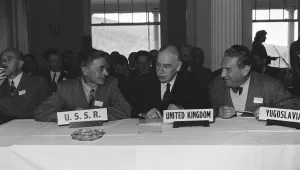International Security is America's leading peer-reviewed journal of security affairs.
Overview
"Unipolarity and U.S. hegemony will be around for some time," declares Barry Posen of the Massachusetts Institute of Technology. Exactly how long will likely depend on the grand strategy the United States adopts. Posen maintains that U.S. military command of the commons— land, sea, air, and space— has enabled the Bush administration to pursue a strategy of "primacy." Posen argues, however, that despite its overwhelming military superiority, the United States will continue to encounter military resistance in so-called contested zones such as Somalia in 1993 and Kosovo in 1999. He contends that the inability of the United States to establish command in these areas suggests that, in the near to medium term, Washington may have greater success in meeting its foreign policy goals by adopting instead a strategy of selective engagement.
Posen, Barry. “Command of the Commons: The Military Foundation of U.S. Hegemony.” Summer 2003





